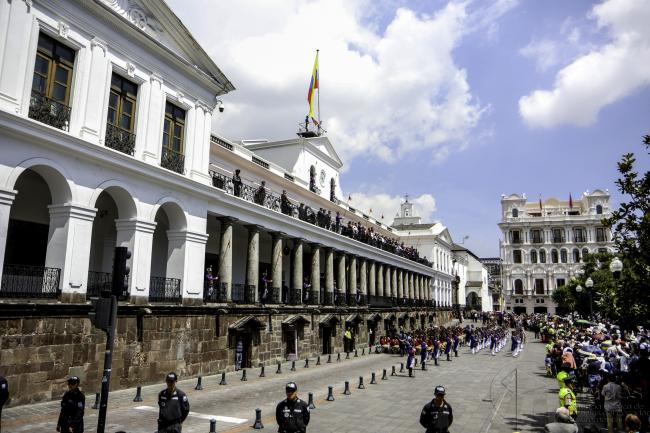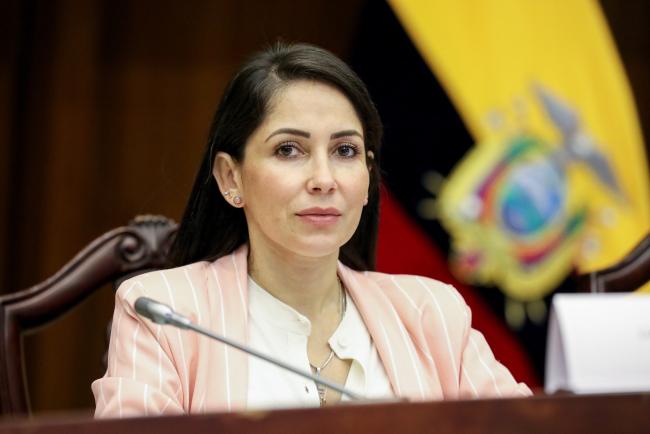
Leer este artículo en español.
Ecuador is experiencing a “perfect storm” that includes an unprecedented public security shock, an economic crisis reminiscent of its worst epochs, and a breakdown in the legitimacy of political power that forced early elections to be held on August 20.
In this context, the current neoliberal right-wing president Guillermo Lassowho dissolved the legislative power earlier in Mayis reinventing himself to face the duo formed by Luisa González and Andrés Arauz, who are seeking victory for Correísmo. If they succeed, González will become Ecuador’s first woman president to win elections.
Correísmo is an Ecuadorian political movement that emerged during the first cycle of progressive governments in Latin America during the first decade of the century. It promoted itself as a system of government that achieved “through profoundly democratic processes, [becoming] the leader in Latin America in reducing inequality, [four] times higher than the average for Latin America,” said Rafael Correa in his keynote speech at the Economic Commission for Latin America and the Caribbean (CEPAL) in 2014.
This movement has an enormous electoral power demonstrated in all the electoral events since then, in which it has positioned itself as the leading political force in the country.
Since the beginning of the administration of former President Rafael Correa, from 2007 to 2017, and then with the victory of former President Lenín Moreno, from 2017 to 2021, Correísmoor the Citizen Revolution, as this movement has been officially namedbecame hegemonic in the political arena. The party won easily and continuously until 2021 when its candidate, Andrés Arauz, won comfortably in the first round of presidential elections but lost by 5 percent in the runoff against current President Lasso.
Together with other Latin American movements, such as Chavismo, Peronismo, and Lulismo, among others, Correísmo represented a wave of change in the continent and a crusade against the right-wing governments of the region, especially after the military dictatorships. These movements represented a breath of fresh air that repositioned politics after several years of conservatism and revived the struggles of the peoples because they demonstrated their capacity to seize and maintain political power and achieve social conquests.
However, Correísmo lost political control and the Right was able to defeat it in the 2021 elections. The loss still hovers like a shadow in the Ecuadorian imagination due to the rise of the banker and current president Lasso. Lasso tried to impose neoliberal policies and was met with fierce resistance, all of which have led to Indigenous uprisings and two attempts of impeachment by the Ecuadorian National Assembly.
CorreaCorreísmo’s principal leader and namesakeis currently living with asylum status in Belgium, after having been prosecuted by the justice system of his country. His former ally, former President Moreno, undertook a crusade during his administration to reduce Correísmo to its minimum expression. Moreno expropriated his party and persecuted its main leaders including former vice-president Jorge Glass who suffered several years of imprisonment.
Nevertheless, Correísmo remained active and articulate. In view of the debacle of the current government and the announcement, for the first time in Ecuadorian history, of the “muerte cruzada” (meaning mutual death or crossed death)a constitutional tool for the early calling of presidential and legislative elections according to article 140 of the Magna Carta, the Revolución Ciudadana quickly positioned itself as favorite in the elections that will have a first round on August 20. If necessary, a runoff election will take place on October 15.
It won nine of the 23 prefectures and 50 of the 221 mayorships, achieving victory in areas that were right-wing strongholds such as the province of Guayas and the city of Guayaquil, where the Social Christian Party (PSC) had governed for three consecutive decades. Correísmo also won in the capital, Quito. The magnitude of this victory can be compared with its historical opponents, the right-wing parties: Lasso’s CREO did not obtain any prefecture and almost disappeared from the political map, and the PSC obtained only 2 prefectures obtaining its worst result during its history as a party.
The right wing is at its worst moment, while Correísmo is on the rise. Revolución Ciudadana, considered with winning the August 20 elections, has selected a female presidential candidate, González, 45 years old, who could make history if she becomes the first female president of Ecuador.
Correísmo Prepares for the Contest
González is part of Correa’s close core and has held several public positions including a seat in the National Assembly where she was spokesperson for her movement on several occasions. However, she had not yet served in any high office positions so her selection as presidential candidate came as a surprise to many. Even so, Gonzalez has been quoted saying “Beyond a candidacy, beyond an option, I am Revolución Ciudadana,” affirming her dedication to Correísmo.
In less than a month and with the support of the Correísta apparatus, she has managed to place herself in first place in the polls, more than doubling the lead of her closest contenders.
In addition, she has an interesting advantage since she is evangelical and will try to dismantle the stereotype of the Christian voter as a radical right-winger, as caricatured by Bolsonarismo in Brazil. She also takes pride in her campesino background and the fact that she was a single teenage mother.
Former presidential candidate Arauz, who obtained 47 percent in the 2021 runoff, will be González’s vice-presidential running mate. Unlike previous campaigns in which Correísta candidates were somewhat distant from their historic leader, both are adhering to their party loyalty on this occasion in hopes of turning the page of the resounding “betrayal.” A betrayal that, in the view of Correísmo’s supporters, was carried out by former president Moreno. Moreno was sworn in with support of the Revolución Ciudadana after having been vice-president of the government, but quickly set up a separate organization and ended up becoming the pivot of Correísmo’s political persecution.
Hoping to avoid a repeat of the 2021 runoff loss, the González/Arauz duo has set the goal of winning in the first round with a short and intense campaign. They will need to obtain either more than 50 percent of the votes, or more than 40 percent and beat their closest rival by at least 10 percent.
Their right-wing opponents Otto Sonnenholzner, Fernando Villavicencio and Jan Topic are scattered and vying with each other for conservative votes.
However, before claiming victory and assuming an automatic triumph due to the favorable conditions that the Revolución Ciudadana’s candidates seem to have, there is still a short but challenging road ahead. Correísmo’s frontrunners will be up against major obstacles very similar to the ones they faced in 2021.

The Obstacles Correísmo Faces
The Achilles heel of the Correísta movement is its difficulty in establishing alliances with Indigenous organizations, with whom it has had strong disagreements. The political movement has been unable to digest the criticisms of the most fractious sectors in a country that, since the beginning of the nineties, has been overcome with effective revolts of social movements.
Although neither the indigenous party Pachakutik, nor the Confederation of Indigenous Nationalities of Ecuador (CONAIE) provide candidacy backing, Yaku Pérezwho in 2021 achieved 19 percent in the first round that almost put him on the ballot and then called for the Null Vote, which received more than 16 percent of the voteshas decided to do it on his own. Pérez’s aspiration is a headache for Correísmo because it splinters its solid niche, and leaves it without the sufficient base to sweep, as it did in its golden age.
Due to the anti-neoliberal stances of both sectors, a union may seem foreseeable in the run-up to the ballot. However, Pérez represents the hard anti-Correísmo wing of the Indigenous movement. On several occasions he has preferred to ally himself with the right wing in order to prevent the Revolución Ciudadana from returning to power, representing a division in the popular movement that could give victory to Ecuadorian conservatism. His famous phrase, “a banker is preferable to a dictatorship” is representative of his political position.
In favor of the Revolución Ciudadana, the neoliberal management of Lasso has enabled bases of both political forces to find similarities with each other. The anti-neoliberal voto útil” or “useful vote”, and the lack of support of Pachakutik and Pérez, may provoke a transfer of the “critical voter” towards the González-Arauz dupla. This duo represents the main pillar of the fight against the macroeconomic adjustment measures carried out by current president Lasso which has resulted in Indigenous revolts and wide disapproval.
The youth vote also voted for another option in 2021: Xavier Hervas (15 percent) has registered his candidacy once again, although without the Democratic Left party that supported him at the time.
One of the unknowns of the Revolución Ciudadana is its capacity to summon these sectors, especially when it has established a “restorationist” narrative that tries beckons a return to the década ganada” or won decade” of Rafael Correa. Young people are not personally familiar with Correa’s administration, and may not be enthusiastic about this “return to the past.”
The latter is significant since the economic elites turn to the candidacy of Otto Sonennholzner once they disapprove politically of Lasso’s government. Polls predict that Sonennholznera young media entrepreneurhas a high probability of making it to the second round.
Not just any old thing is at stake. A country with an enviable economic situation, once isolated from neighboring criminal syndicates, is a concept of the past. The neoliberalism installed in both Moreno’s and Lasso’s governments has only deepened social exclusion.
Correísmo offers to change the course of the country and fit into the new progressive cycle that is being experienced in Latin America.
This August 20 and, if necessary, in a runoff on October 15, Ecuador will decide its future amidst the worst threats in its recent history. Right-wing entrenchment may lead to deeper crisis. Will Correísmo reverse this trend? We will know in coming weeks.
Ociel Alí López is a sociologist and winner of the Clacso/Asdi awards for young researchers and the Caracas municipal literature prize. He is a professor at the Universidad Central de Venezuela and writes on Latin America.

